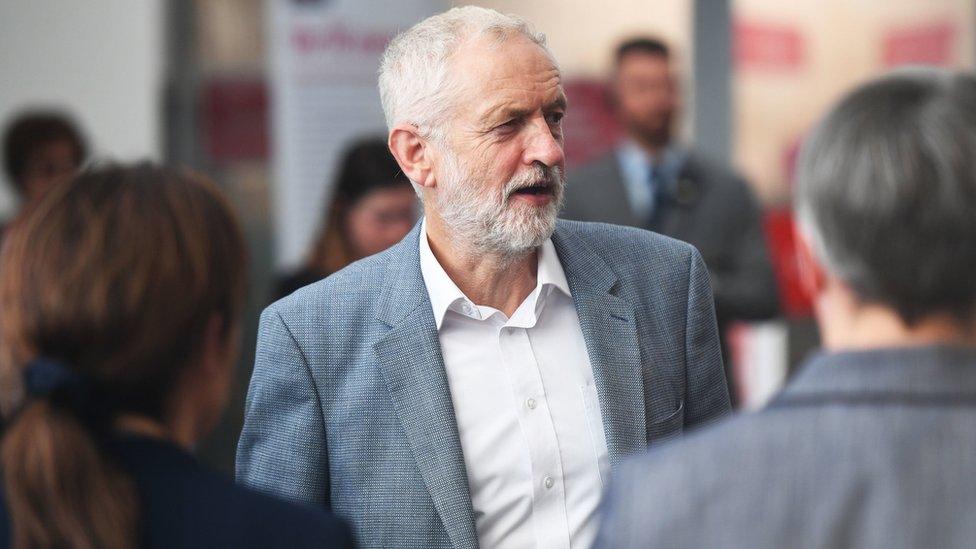Brexit: What's Jeremy Corbyn's thinking?
- Published

Just 24 hours after Jeremy Corbyn hammered out a deal with the Labour-supporting unions, his deputy, Tom Watson, shattered any fragile unity.
Mr Watson and many Labour activists want a clearer commitment to campaign on a Remain platform - especially during a snap election.
So, apart from his own scepticism towards an EU that he believes needs reform, what is the thinking behind Jeremy Corbyn's position?
First, psephology - or how the votes could stack up
Most Labour voters, even in many Leave areas, backed Remain.
But the party needs to win over people who abandoned them in 2015 and 2017, and many are in Leave constituencies.
It is felt that if the leadership campaigns during an election to remain, these potential voters will be alienated.
So, best put off the decision until after the election and declare only in the event of a Labour victory and a subsequent referendum.
But, you may say, won't the mere offer of a referendum put these voters off?
It's been a fairly extraordinary few days in the House of Commons
Labour strategists acknowledge it will be a barrier for some.
But the hope is that in "left behind" areas, voters who back Brexit won't see it as the main issue.
Instead, jobs, the health service, austerity and other issues might take precedence on polling day - just so long as the voters can be assured they can deal with Brexit separately and have the opportunity to repeat a Leave vote if they wish.
As for those who don't want to leave the EU, the existence of Remain on the ballot paper should reassure.
Clearly, some voters might want a full-throated Labour endorsement to stay.
But the expectation is that some (at least) will end a flirtation with the Lib Dems, thinking Labour is best placed to defeat Boris Johnson and a hard Brexit, and form an alternative government.
Second, party unity
Some big unions - such as Unite - want a Leave deal, while others - such as the GMB - want a "final say" referendum and really want to Remain.
But Mr Corbyn, along with party and union officials, have brokered a compromise.
Efforts will be put into getting a Leave deal - pleasing Unite - but there will also be an option to Remain - pleasing the GMB.
Smaller unions with more strident positions on Leave - such as the CWU - and Remain - such as TSSA - seem on board.
And with unions on Mr Corbyn's side - with the 50% of votes they control at the annual conference - he has a very good chance of getting this policy formally endorsed, despite some significant dissent
Third, politics
If Labour doesn't commit to remain during the election, then it hopes to be inoculated against the charge that it would waste time negotiating a Leave option that it would never endorse.
Fourth, personal authority
I am told Mr Corbyn has drawn a "red line" when it comes to making Labour a "Remain" party.
While he has listened to many strident shadow cabinet voices on tactical issues - such as election timing - strategically, he wants to be seen to be bringing Leave and Remain voters together and won't compromise further on Brexit, even though many on the Left (not just Tom Watson) would wish him to do so.
However, some haven't given up hope they can yet convince him there is no "credible Leave option", and if he is in a position to call a referendum, he'll opt for Remain.
As they say, good luck with that.
But he is certainly content to have senior MPs campaign on different sides.
Insiders, though, know it will be difficult to manage dissent.
John McDonnell, I am told, was strongly criticised by Unite's Len McCluskey over repeatedly making public his personal preference for Remain.
But back in the 1970s, Labour was openly split at the 1975 EU (or EEC) referendum and all those divisions were well-known the preceding year - when the party first ousted the Conservatives in February 1974 and won a narrow majority in October.
So, expect strategists to be consulting political histories to see how it was done.